We Make the Road by Walking: A Year-Long Quest for Spiritual Formation,
Reorientation and Activation by Brian McLaren (Jericho Books) $25.00 – OUR SALE PRICE $20.00
The Divine Conspiracy Continued: Fulfilling God’s Kingdom on Earth by Dallas Willard with Gary
Black, Jr. (HarperOne) $25.99 – OUR SALE PRICE $20.79
In our last post we raved about a lovely new book of
spiritual reading, part memoir, part social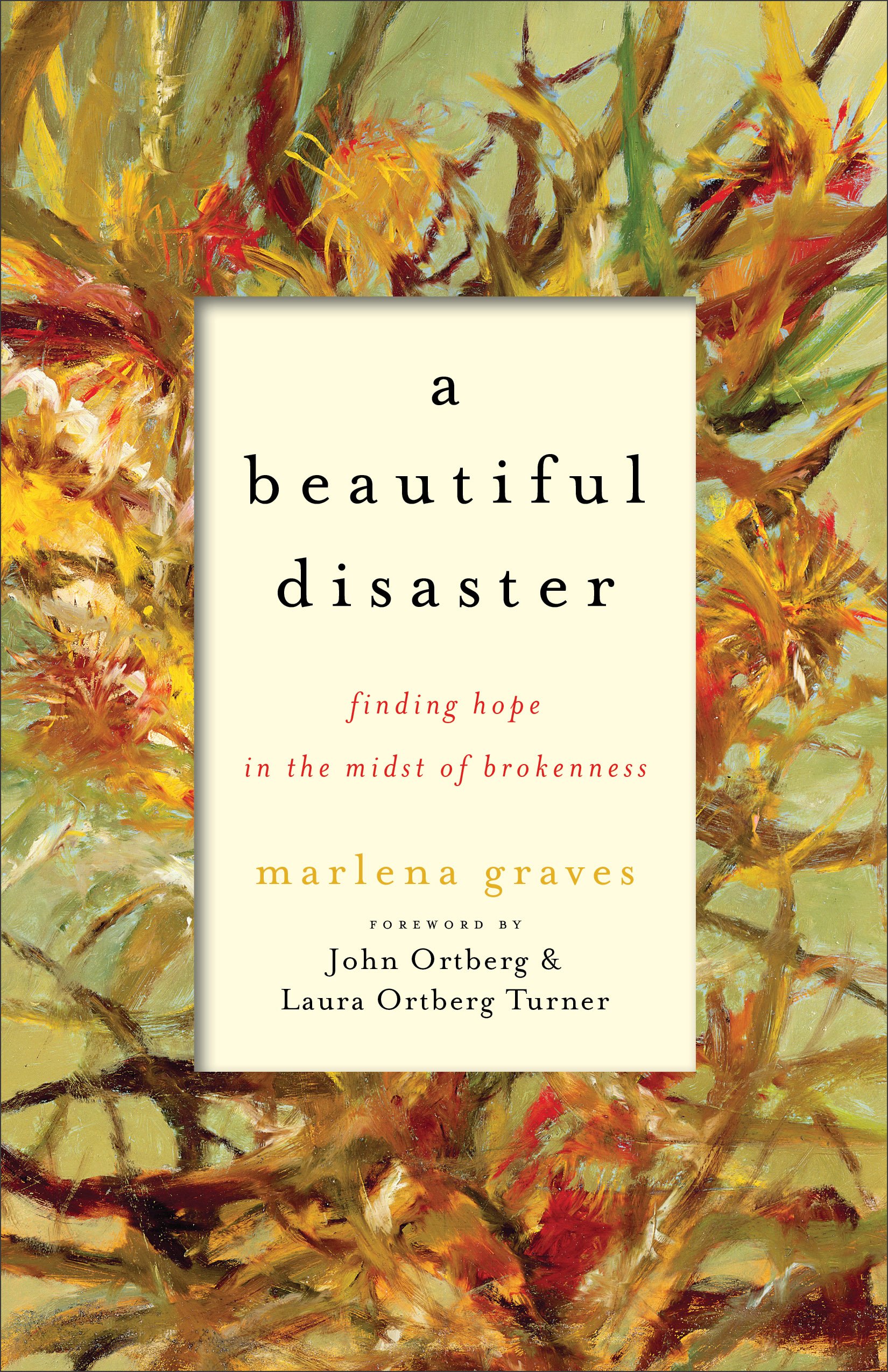 critique, part guide to finding
critique, part guide to finding
hope in hard times, A Beautiful Disaster: Finding Hope in the Midst of Suffering by
Marlena Graves (Brazos Press; $15.99.)
It is recommended because it is so very honest, as Marlena shares the
story of her own hard times, and yet points us in clear and helpful ways, by
teaching various Bible stories, how to find God’s presence day by day, offering
ways to experience Christ’s grace, and ways to be empowered by the Holy Spirit.
This book is rooted in the devotional classics (and throws in some fun pop
culture references and contemporary writers as well.) We are sure it will be a blessing to you or your group, so
we heartily recommended it. She is a first-time author, although writes often
for blogs and on-line journals, and we think deserves a wide readership.
Two books have come out this week that seem similar, in that
they are about spiritual formation, both by well-known authors. They are a bit
different in theology and tone, but we are very excited to tell you about them
both. We would be thrilled if you
order either, or both, from us. As
is often the case here at BookNotes, we have them on sale, and you can order at
the quick line found at the end of this piece. (Funny how many people write asking how they can acquire
these, apparently not realizing we are a real bookstore, trying to make a
living selling these resources.)
F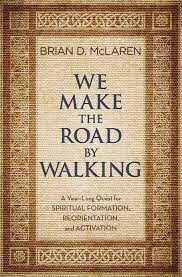
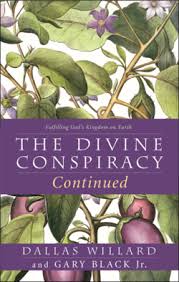 irst, I’ll explain an innovative and engrossing,
irst, I’ll explain an innovative and engrossing,
year-long devotional guide by Brian McLaren, We Make the Road by Walking: A
Year-Long Quest for Spiritual Formation, Reorientation and Activation
(Jericho Books; $25.00.)
Next, I’ll describe the brand new sequel to the Dallas
Willard classic The
Divine Conspiracy, co-written during his recent illness by Gary Black and released posthumously after Dallas’s untimely death a year ago called The Divine Conspiracy Continued: Fulfilling God’s Kingdom on Earth (HarperOne;
$25.99.) Although Dallas continued to hold to utterly orthodox, historically
evangelical faith, and Brian has evolved into what might be called a
progressive post-evangelical, the two men knew and, I gather, cared for each other. Both were voracious readers, drew on
ecumenical sources, and organize much of their work on inner transformation by
way of talking about our union with Christ in the Kingdom of God. (Indeed, Dallas
told me once that “the divine conspiracy” was to be heard as a synonym for the Kingdom of
God, devoid of sexist overtones.) They are both very interested in facilitating conversations about the nature of deepened discipleship, faith of the heart and mind and hands and feet.
My life is richer because of them both. They both have a section in our esteemed authors wall in the shop.
McLaren and Willard agreed that alongside our
own inner transformation there are dynamic impulses and trajectories of the proclamation
of Christ as Lord that ripple outward into the public sphere. From Brian’s book on the Kingdom of God (The Secret Message of Jesus) to the very important Everything Must Change: When the World’s Biggest Problems and Jesus’ Good News Collide to the chapters on
politics and economics in the new Dallas Willard volume, both men use their vast
intellectual resources and their deep experiences of spiritual formation, to
point people to socially-engaged, wholistic Kingdom visions and prophetic
imaginations of cultural change.
These two books, despite their differences (and there are significant differences) could be read in tandem, and
could prove to be transformational, game-changing, even, maybe creating generative aha-moments that
are decisive for you and your faith community. I am sure I will be challenged
as I work through them more carefully over the next months, and I invite you to
join me on the journey. What joy
to get to introduce you to these books by McLaren and Willard, friends along
the way, agents of the Kingdom.
Man, I love my job!
I suppose I don’t have to tell too many of our readers about
the much-discussed books b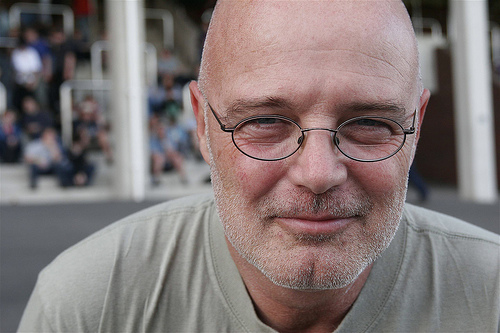 y Brian McLaren. Allow me to (again) clear the air a
y Brian McLaren. Allow me to (again) clear the air a
bit (or add some fog, as the case may be) since Brian is well-loved by many,
and truly despised by some. (Others are pleasant and balanced; they like him,
mostly, but find some of his current thinking a bit unorthodox. Such readers
look for the good, and take everything with a discerning grain of salt. Fair
enough?)
Brian is a friend and although I do not know him too well,
whenever I have been with him, I have found him to be an extraordinary leader
and a fine, thoughtful spokesperson for considered theological and
Biblically-rooted faith. I have worked informally with him on a few small
projects and my name even appears in Naked Spirituality: A Life With God in 12 Simple Words, a fine book of creative spiritual formation for
seekers or beginners looking for a guide that is a tad unusual. So I like him.
This big new book will illustrate much about his love of and insight about the
Scriptures, echoing themes from his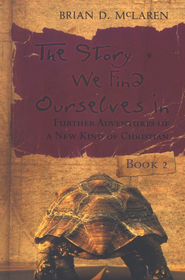 great 2003 novel The Story We Find Ourselves In.
great 2003 novel The Story We Find Ourselves In.
As it ends up, I don’t agree with everything he always says, and I
like some of his books more than others.
But – as is our custom here at Hearts & Minds – we believe in
reading widely, perhaps (for those of us who are well grounded in the best of
the Christian tradition and in a solid community of mature believers)
especially reading stuff we may not be in full agreement with. We can learn and grow by taking a pen
to the page and working with a text — no need to get all alarmist and upset,
let alone nasty, because somebody puts something in a way you find unusual or
wrong. Read, pray, write, talk,
read some more, be generous and discerning, taking in that which bears fruit
and rejecting that which is a distraction to your growth in the Kingdom. So,
even though some of my conservative friends (with whom I share many theological
tenets) will disapprove, I think Brian’s work with creative, inclusive theology and
Biblical study is valuable, inspiring, and very much worth
reading. For those who are not
likely to fret about whether he is conservative enough or how he has drifted
from the conventional formulation of the fundamentals of faith, I think you
will be pleasantly charmed into realizing that his lively and broadly
evangelical faith is both inviting and healthy — and maybe even contagious.
Which I guess I say in order to say this: whether you see
yourself as a stalwart evangelical and McLaren critic or whether you are
happily of a more liberal theological persuasion, I think We Make the Road By Walking: A
Year-Long Quest for Spiritual Formation, Reorientation and Activation is
going to be good for you, maybe even fun and interesting.
Here’s why.
F irstly, this is a big overview of all manner of Christian
irstly, this is a big overview of all manner of Christian
insights and practices, a guide to faithful discipleship in light of McLaren’s
progressive vision, in conversation with what he has called a “new kind of Christian”
(which, frankly, is not that new.) It seems to me this view makes him, to be
overly simplistic about it, perhaps the most liberal/ecumenical person when he
is among his conservative evangelical friends and yet the most evangelically
passionate when among his more liberal friends. (Show of hands if you’ve been there?!) As a former church
planter and pastor of a non-denominational congregation who now worships at an Episcopalian
parish (and who has traveled and listened well in the global south) he knows the breadth of church
life – and that makes him a voice worth listening to. McLaren is passionate and upbeat and
visionary, to be sure, making him fun and a bit feisty, but he isn’t that
unusual or odd. There are plenty of lengthy footnotes and good explorations of things we all should be considering, so this is a rich compendium and an example of ecumenical, generous, living faith.
In a way, this is both a greatest hits album and a perfect intro to why Brian (and the emergent/mainline convergence he represents) is such a widely-read and much-discussed author and leader. It is a safe and good way to grapple with big questions and hard stuff. I think this is a good, good thing and hope you do too.
In this book he walks us through the church year (starting
in September) with 52 readings, which can be read one chapter per week. The book tends to follow an abbreviated
church calendar, which is really good, but it is also a basic Bible
overview. What he draws out of
various Scriptural passages is wonderful, wonderfully put, and very, very
helpful – whether you know the Bible well, or if you are a beginning Bible
reader. I have found everything I’ve read so far to be right on and quite
lovely, even if some is standard fare.
For instance, he teaches us that the Genesis story helps us stand in awe
and wonder of all creation; we are made in God’s image so have dignity and
worth, and all of life has meaning; the middle of the Hebrew Scriptures offers
a robust conversation on the meaning of faith, with law and story, poets and
mystics, kings and prophets, pointing us to God’s promises of restoration and
blessing; Christ’s resurrection power gave the new disciples new energy and
fearlessness to proclaim the Kingdom, Paul taught about renewed community and
inclusion and a Christ-honoring missional agenda, with love trumping all.
So,
yep, this really allows readers to re-orient themselves around the big,
unfolding drama of Scripture as it builds from creation to covenant to crisis
to Christ to final consummation.
Not only is this an evocative and well-written, year-long overview of the Biblical story
with a keen sense of the biggest themes and the social implications of those
acts in the drama, it has a certain, appealing writing style, a style that
pervades most of Brian’s books; it is semi-scholarly, informed by everything
from quantum science to ancient near east history to postmodern literary theory
to the nonviolent philosophy of Rene Girard, but yet is conversational,
entertaining, moving, even. (He lapses into “first person” drama a few times, which is very neat, putting you right into the story.) Few authors can bring so much learning to the
table, weave together so much interesting and curious stuff, and yet sound
upbeat and hopeful. He trusts he readers, and he manages to help us along the
way, bit by bit.
Certainly there are other books that may teach the Bible in
a year that are more detailed and more thorough, but at least one big benefit
of this is the fun (and important) dots that are connected, the good ideas that
are brought into play, the storytelling and wordsmithing that seems to come so
naturally to him. Brian was an
English professor at one point (and has good music tastes, too, citing Bruce
Cockburn and other fine songwriters in other books) so unlike some theologians
and Bible teachers and church leaders, he can write. Heck, he can sing and some of this book seems to as well.
Further, as the title suggests, the faith journey we
undertake in We Make the Road… is a bit unfinished – we have to do the
walking. You know that old saw, sometimes made trivial on trinkets and wristbands, “Please be patient, God is not finished with me yet”? Well, it is true, after all, isn’t it? We are growing, changing, our faith moves along. God is at work in us, and yet, in some profound way, we play our part, do our thing, taking responsibility for our own
spiritual formation and how we choose to engage the world around us (including our
churches, our neighborhoods, and our global connections.) We don’t know what’s ahead. For what it is worth,
I do not think (for those aware of this sub-set of progressive theology) that
Brian is a “process theology” guy and he doesn’t sound quite like Teilhard de
Chardin, just for instance. But he
does insist that we must cultivate our interior lives as we come to understand
God’s work better, and that this involves change, growth, openness to new
ideas, and being guided by the Spirit into what might be new territories. God’s
work is unfolding and we are inviting to participate by being open to change.
As he puts it,
… faith was never intended to be a destination, a status, a
holding tank, or a warehouse. Instead, it was to be a road, a path, a way out
of old and destructive patterns into new and creative ones. As a road or way,
it is always extended into the future. If a spiritual community only points
back to where it has been or if it only digs in its heels to where it is now,
it is a dead end or parking lot, not a way.
I appreciate this call to walk the way of a living tradition, “cherishing
and learning from the growing treasury of its past” as he put it. Yet, we can
and must re-imagine what it means to live joyfully and responsibly, with verve
and gusto, in these times, for these times. (There’s that I Chronicles 12:32
again that I sometimes cite, eh?)
I wonder if the title (used first, he thinks by the great Mexican
educator Paulo Freire) overstates things a bit – we don’t really have to build
an entirely new road, after all since we stand on the shoulders of others,
always holding to the apostolic gospel message, even if our formulations evolve
and change in each new era.
Here is how McLaren puts it in the preface:
(This) is a work of constructive theology – offering a
positive, practical, open, faithful, improvable and fresh articulation of
Christian faith suitable for people in our dynamic times. It is also a work of public and practical theology – theology that is worked out by ‘normal’
people in daily life.
McLaren is not suggesting that anything goes or that we make
stuff up as we go along, willy-nilly. He knows that the task of doing
constructive theology is rigorous, constrained (although he might choose that word) by the Biblical texts. In fact, in the introduction he has
several pages and good footnotes exploring the role of catechesis — he
cites Luther’s Small Catechism, notes Calvin’s important work, and quotes
Wesley’s “Instructions for Children” written in 1745. McLaren is on to something when he writes that, early on,
catechesis was a subversive practice of movement building. It was a “people’s
seminary,” transforming any room, campfire, or shady spot beneath a tree into a
movement school. It equipped the oppressed and the oppressors to become
partners and protagonists in their mutual liberation.
Learning the faith anew
today should feel like that: being enfolded into and shaped by a liberating
movement. A God Movement, as “Cottonpatch” Clarence Jordan used to say.
It is no accident that Brian calls this quest a process of “reorientation and activation.” We
don’t just need a fresh version of the ideas of faith, reoriented opinions.
For him — as for the Bible itself – we are invited/commanded to be “doers of
the Word.” Faith without works is
dead (to use the language of the Epistle of James and of Jesus, too) so we have
some serious building to do, some repair work to offer this broken world. No, we don’t save the world ourselves – God’s
grace is abundant enough for that – but we have our stitches to weave. There is work to be done. We have
to get active. This is a big theme of the book.
The biggest rhetorical theme, a theme that is sounded out
in every section, implied on almost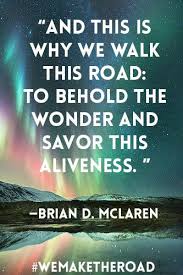 every page, is that this is a resource for
every page, is that this is a resource for
those seeking to live their lives in ways that can be called truly alive. We are invited to attentiveness
and wonder, to be mindfully aware and child-like eager, vibrant with “abundant
life” (John 10:10.) The
introduction of We Make the Road by Walking is entitled “Seeking Aliveness” and
the four sections of the book are called “Alive in the Story of Creation,” “Alive
in the Adventure of Jesus,” “Alive in Global Uprising,” and (starting on
Pentecost Sunday) “Alive in the Spirit of God.” Yes, this is a handbook to aliveness, abundance, adventure
and more. Such an audacious vision could not be told in boring prose and such am organic message wouldn’t ring true in the hands of a dull writer. So, gladly, this book
is energetic and interesting and itself quite alive.
A final feature of this book, and it is not incidental, is
how many discussion questions there are. This book can be read solo, of course,
but Brian — ever the pastor, educator, spiritual director and movement
organizer — hopes that it is to be read in community. It has abundant and
carefully crafted reflection questions to help us engage the text not only at
the end of each of the 52 chapters, but also offers what he calls “quarter
queries” at the end of each of the four parts. Written with sensitivity, McLaren hopes this is used within churches, maybe in interfaith groups, among skeptics, seekers, or those feeling exiled from a local congregation. There are a few appendices offering guidelines for good
group dynamics, and a litany or two to use for those that want a more
liturgical component to their times together.
Those who buy We Make the Road by Walking get their money’s worth, that’s
for sure. As Phyllis Tickle writes,
“This is one of the most remarkable documents in recent Christian writings… The
result is as startling as it is beautiful.”
Listen to Brian express his own hopes, shared at the end of his great introduction:
Right now I’m imagining a couple of each of you, gathered around a table filled with brimming glasses and plates of flavorful foods. You’re all engaged in animated conversation, telling jokes, sharing stories about your experiences since you last gathered. Partway through your meal, someone says “The Living God is with us!” and everyone else responds “And with all creation!” And then someone begins to read.
So, it’s a year-long, once-a-week overview of the Bible, offering
a call to inner transformation and social action, to be read in groups, to enlist us
to the Triune God’s movement in the world, from a “new kind of Christian” progressive
vision. It can be read alone, but it’s better to be explored with a group, a fun, friendly group. That’s the gist of the great new book by Brian McLaren, and (agree or not
with every detail) it is really worth having and it’s project is well worth taking up. I don’t think I know of any other resource quite like it. Enjoy!
****
Here is another amazing new summer book, a very,very profound work, most likely
the last we’ll hear from this dear departed saint. It is an honor to tell you about the latest and last book from Dallas Willard.
T he Divine Conspiracy Continued: Fulfilling God’s Kingdom on Earth Dallas Willard & Gary Black
he Divine Conspiracy Continued: Fulfilling God’s Kingdom on Earth Dallas Willard & Gary Black
(HarperOne) $25.99
You may know that the contemplative master Richard Foster
wrote back in 1998 a most stunning introduction to the groundbreaking and still
best-selling Dallas Willard work, The Divine
Conspiracy (“the book I’ve been searching for my whole life.”) That brief but potent intro is, I think, the most affirming foreword
I’ve ever seen in a book. On the
back of this brand new one Foster reminds us of that by saying, “I consider The Divine Conspiracy to be the most important book in the field of
Christian spirituality in my lifetime. So I welcome the publication of The
Divine Conspiracy Continued, which expands on and enriches the themes
that moved us so deeply.” What
more can I say? Wow.
I have written recently at BookNotes about two new Willard-esque John
Ortberg books, one published by IVP that was co-written with Dallas (Living in Christ’s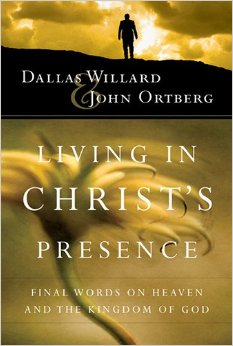 Presence), and one in
Presence), and one in
which he tells about things he learned from many meetings with Dallas (Soul-Keeping.) He too, has a stellar
blurb on the back of The Divine
Conspiracy Continued. The Presbyterian pastor Ortberg says, “I know of no
more important voice on spiritual truth in our day than that of Dallas Willard.
To be able to receive fresh words from him along with Gary Black Jr on the
reality of the kingdom in our midst is a priceless gift.”
Oh my. Let that endorsement sink in.
We’ve come to value Gary Black’s work, and he was a natural choice to be the one to co-write this book with Dallas last year – he had done his
dissertation on Willard, and has a very informative work called The Theology of Dallas Willard: Discovering
Protoevangelical Faith (Wipf & Stock; $29.00.)
A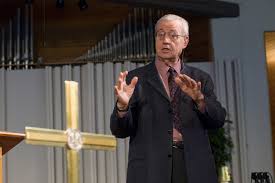 s with McLaren, although in less colorful writing and less,
s with McLaren, although in less colorful writing and less,
shall we say, creative formulations, Willard has always been interested in how
the cross and resurrection of Christ can transform our very selfhood, our
personality, our habits and practices and then how that spills out into our social
experiences and cultural influence. He has thought harder about this then most.
His fabulous early book The Spirit of the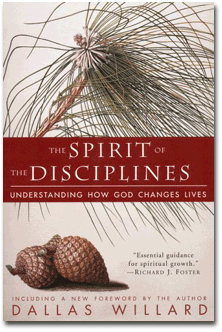 Disciplines: Understanding How God Changes Lives (HarperOne; $15.99) remains a must-read and
Disciplines: Understanding How God Changes Lives (HarperOne; $15.99) remains a must-read and
offers a great introduction to his view of the sanctifying work of God in our
lives. It even
includes a chapter on the role of the body in spiritual formation.
It is
interesting to me that even though many people write about “formation” these
days, many of these books are merely devotional — tender, creative, monastic,
mystical, perhaps, but still just feel-good stimulation. Professor Willard
offers us gentle wisdom and actual guidance about how our souls can, in fact,
be changed. Christ’s ways and His virtues and God’s Kingdom’s presence can be a
reality in our lives — perhaps his systematic thinking about this might be analogous to a Protestant Saint Ignatius. As Dr. Willard put it in another good resource, God can
grant us “the renovation of the heart.” (Renovation
of the Heart: Putting on the Character of Christ; Navpress; $16.99) Another book which can serve to introduce
you to Willard’s serious theories and remarkable applications of the gospel is
in the aforementioned InterVarsity book (a lovely hardback and excellent video
series, too) entitled Living in God’s
Presence (book, $20.00; DVD, $30.00.) That was created from the transcripts of talks and subsequent
interviews and conversations with John Ortberg that were done at a conference. That, too, is an amazing book, moving us from “sin management” to a truly transformed life
as we take up the way of Christ, day by day, moment by moment, made gladly more human, more ourselves, by
Him, for Him.
This brand new follow-up to his masterpiece The Divine Conspiracy, The Divine Conspiracy Continued is co-authored by Gary Black and pitched both as a sequel to it and
as an application volume, too. It seems to be aimed particularly at leaders (as
it says on the back, “God’s plan for leaders.”) as the Kingdom principles in DC are clarified and enhanced for those
who serve in public life. This, of course, means it is not just for clergy, or even those involved in para-church ministries. It is for anyone,
almost, who longs for greater resources in the creation of a sensible and influential life; as the subtitle says, it is about “fulfilling God’s Kingdom on Earth” and is therefore for any persons who long to live out their own sense of
calling to vocations in the world.
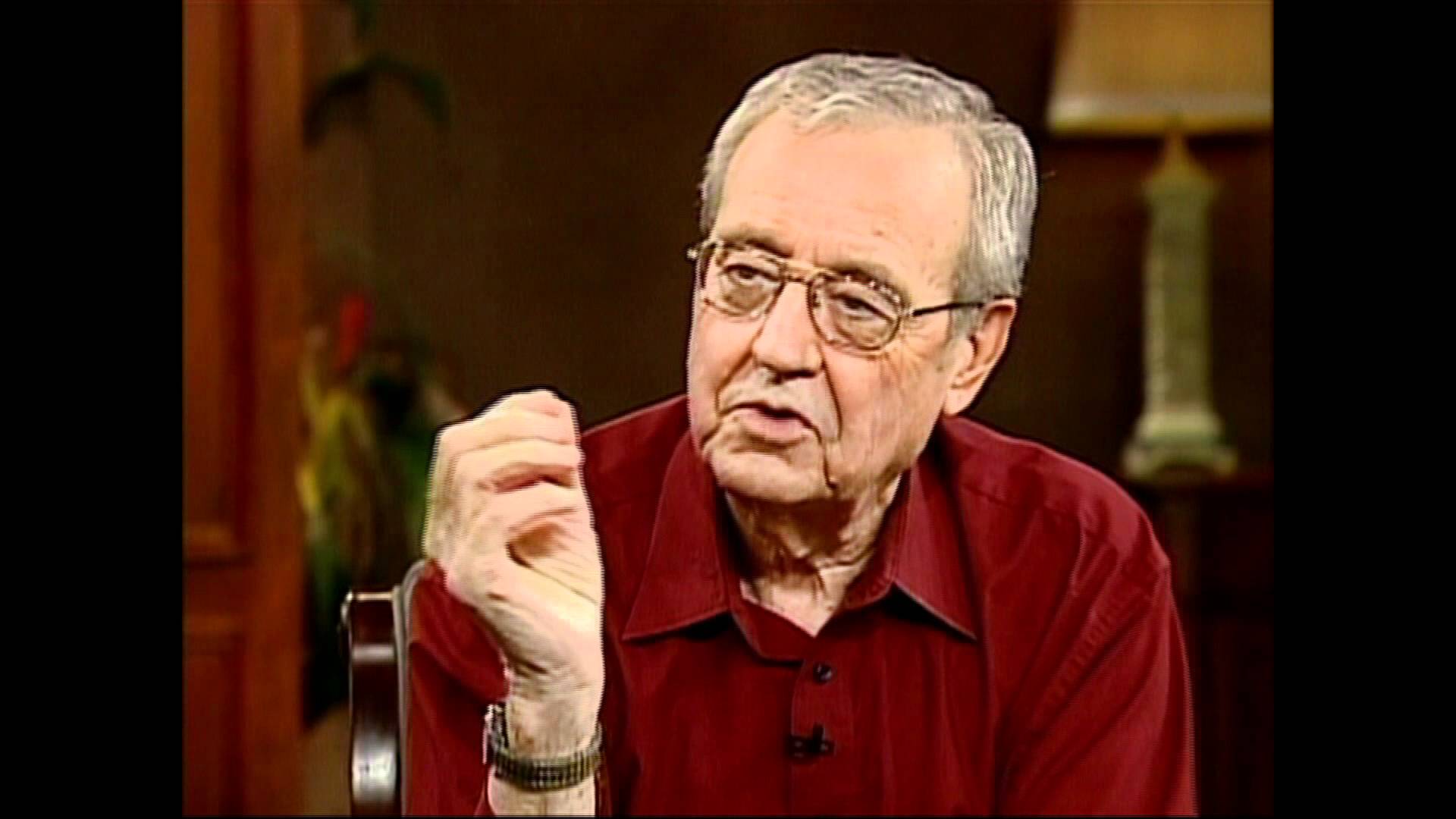 Willard not only gifted us all by writing these weighty and
Willard not only gifted us all by writing these weighty and
influential handbooks to Christian growth and Kingdom living over the last 30 years, he was, in his
day job, a professional philosopher (at the prestigious University of California.) He
pondered well the nature of knowing, what we mean by the moral life, the
integration of faith and learning, the role of reason, and what it might be to “redeem reason,” the
relationship between thinking and feeling, knowing and doing. He isn’t writing
here as a scholar, but his lifetime of teaching about such important matters
has shaped him, and he thereby brings these valuable insights to bear upon the
work of spiritual formation.
There is, however, an interesting chapter on being
a Christian intellectual, including some of
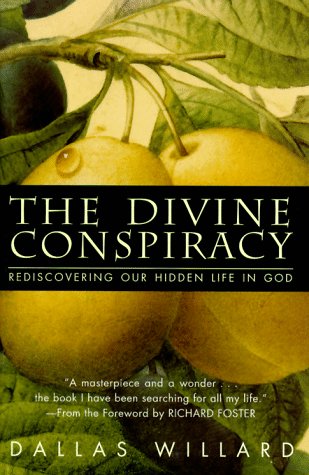 his views about education,
his views about education,
Christian and otherwise, which would be especially good for anyone working in the fields of education. Willard had a passion to equip and encourage
well-placed, well-informed people of moral integrity who would be guided by the
ways of Jesus and, say, the Sermon on the Mount; and he gave much of his life
to serving those wanting direction and insight about living out faith in the
modern world.
From this beginning stages of planning, this was to be a co-authored project; together Black and Willard designed a book to
help encourage the transformation of leaders who could “subvert human
governance” (a phrase I wish he’d have explained a bit, but I gather he means
that we are to be salt and light and leaven, bringing God’s redemptive ways to
society.) Willard understood the
nature of truth and true knowing, that belief has consequences, that ideas grow
legs, and – to borrow McLaren’s language, that we all sorely need “spiritual
formation, reorientation, and activation.”
Black writes in the foreword,
Dallas’s greatest hopes, and
mine, would be for men and women from every walk of life and every profession
and vocation that serves our society – teachers, attorneys, physicians,
pastors, accountants, tradespeople, and businesspeople alike – to read and
discuss this book together…. Wherever leaders gather to discuss their visions
and hopes for God’s mission to our world.
Oh, BookNotes friends, you know how we need this kind of clear-headed, deep (but not
arcane) guidance into how one can cooperate with God in the transformation of
the human soul, how that actually leads to real improvement of life; we really do need help in walking in the ways
in which we can become more committed to and effective for the coming
commonwealth of God, in every sphere of culture. As Black notes, there are
chapters here for business folk and physicians and other professionals – interesting
for all of us, I’d say. By the way, I’d say this is valuable also for pastors
or teachers or campus ministers who are called to mentor others in these professional fields. One
good chapter is called “Leaders Who Follow the Shepherd” and it is very
profound.
Not unlike the McLaren book, there is included an extensive
discussion apparatus and reflection questions for each section. Not only are
there some good questions to ponder or discuss, there are suggested experiences
that one can enter into. The
Divine Conspiracy Continued: Fulfilling God’s Kingdom on Earth really is like a long workshop with Dallas, and
it may be the last serious work we have from him.
We cannot recommend this book more seriously, or commend it with
such confidence that it is a very, very important book for our times. Thanks be
to God for Dallas Willard, for his life, his teaching, and for his friend Gary Black who together wrote this extraordinary book. Buy it today.
BookNotes
DISCOUNT
ANY ITEM MENTIONED
20% off
order here
takes you to the secure Hearts & Minds order form page
just tell us what you want
inquire here
if you have questions or need more information
just ask us what you want to know
Hearts & Minds 234 East Main Street Dallastown, PA 17313 717-246-3333
